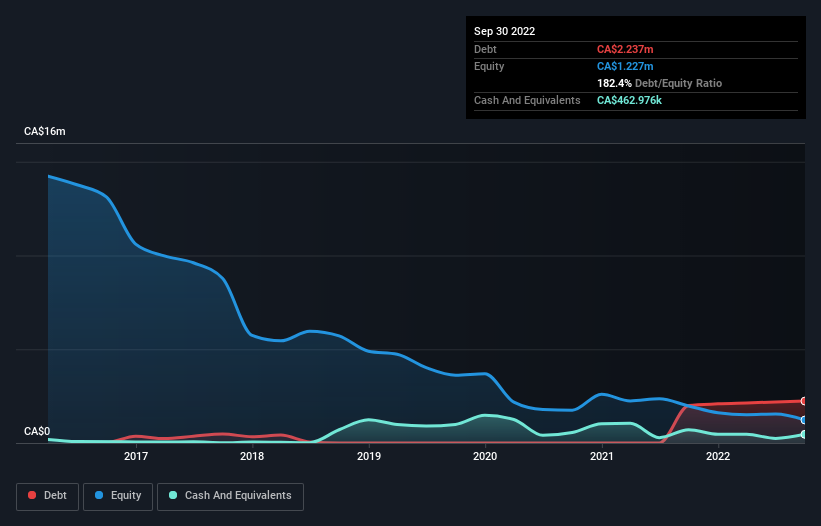Some say volatility, rather than debt, is the best way to think about risk as an investor, but Warren Buffett famously said that 'Volatility is far from synonymous with risk.' So it might be obvious that you need to consider debt, when you think about how risky any given stock is, because too much debt can sink a company. As with many other companies New Zealand Energy Corp. (CVE:NZ) makes use of debt. But the real question is whether this debt is making the company risky.
When Is Debt A Problem?
Debt and other liabilities become risky for a business when it cannot easily fulfill those obligations, either with free cash flow or by raising capital at an attractive price. If things get really bad, the lenders can take control of the business. However, a more usual (but still expensive) situation is where a company must dilute shareholders at a cheap share price simply to get debt under control. Having said that, the most common situation is where a company manages its debt reasonably well - and to its own advantage. When we think about a company's use of debt, we first look at cash and debt together.
See our latest analysis for New Zealand Energy
How Much Debt Does New Zealand Energy Carry?
As you can see below, at the end of September 2022, New Zealand Energy had CA$2.24m of debt, up from CA$2.00m a year ago. Click the image for more detail. On the flip side, it has CA$463.0k in cash leading to net debt of about CA$1.77m.

How Healthy Is New Zealand Energy's Balance Sheet?
We can see from the most recent balance sheet that New Zealand Energy had liabilities of CA$4.85m falling due within a year, and liabilities of CA$7.15m due beyond that. Offsetting these obligations, it had cash of CA$463.0k as well as receivables valued at CA$1.71m due within 12 months. So its liabilities total CA$9.83m more than the combination of its cash and short-term receivables.
This deficit casts a shadow over the CA$3.71m company, like a colossus towering over mere mortals. So we definitely think shareholders need to watch this one closely. After all, New Zealand Energy would likely require a major re-capitalisation if it had to pay its creditors today. There's no doubt that we learn most about debt from the balance sheet. But you can't view debt in total isolation; since New Zealand Energy will need earnings to service that debt. So if you're keen to discover more about its earnings, it might be worth checking out this graph of its long term earnings trend.
In the last year New Zealand Energy's revenue was pretty flat, and it made a negative EBIT. While that hardly impresses, its not too bad either.
Caveat Emptor
Importantly, New Zealand Energy had an earnings before interest and tax (EBIT) loss over the last year. Indeed, it lost CA$219k at the EBIT level. Combining this information with the significant liabilities we already touched on makes us very hesitant about this stock, to say the least. That said, it is possible that the company will turn its fortunes around. But we think that is unlikely, given it is low on liquid assets, and burned through CA$119k in the last year. So we consider this a high risk stock and we wouldn't be at all surprised if the company asks shareholders for money before long. When analysing debt levels, the balance sheet is the obvious place to start. But ultimately, every company can contain risks that exist outside of the balance sheet. For example, we've discovered 3 warning signs for New Zealand Energy (2 make us uncomfortable!) that you should be aware of before investing here.
If, after all that, you're more interested in a fast growing company with a rock-solid balance sheet, then check out our list of net cash growth stocks without delay.
Valuation is complex, but we're here to simplify it.
Discover if New Zealand Energy might be undervalued or overvalued with our detailed analysis, featuring fair value estimates, potential risks, dividends, insider trades, and its financial condition.
Access Free AnalysisHave feedback on this article? Concerned about the content? Get in touch with us directly. Alternatively, email editorial-team (at) simplywallst.com.
This article by Simply Wall St is general in nature. We provide commentary based on historical data and analyst forecasts only using an unbiased methodology and our articles are not intended to be financial advice. It does not constitute a recommendation to buy or sell any stock, and does not take account of your objectives, or your financial situation. We aim to bring you long-term focused analysis driven by fundamental data. Note that our analysis may not factor in the latest price-sensitive company announcements or qualitative material. Simply Wall St has no position in any stocks mentioned.
About TSXV:NZ
New Zealand Energy
Through its subsidiaries, engages in the exploration, production, development, and appraisal of oil and natural gas in New Zealand.
Moderate risk with worrying balance sheet.
Market Insights
Community Narratives



